牛津译林版英语9A unit2 grammar (共38张PPT)
文档属性
| 名称 | 牛津译林版英语9A unit2 grammar (共38张PPT) |
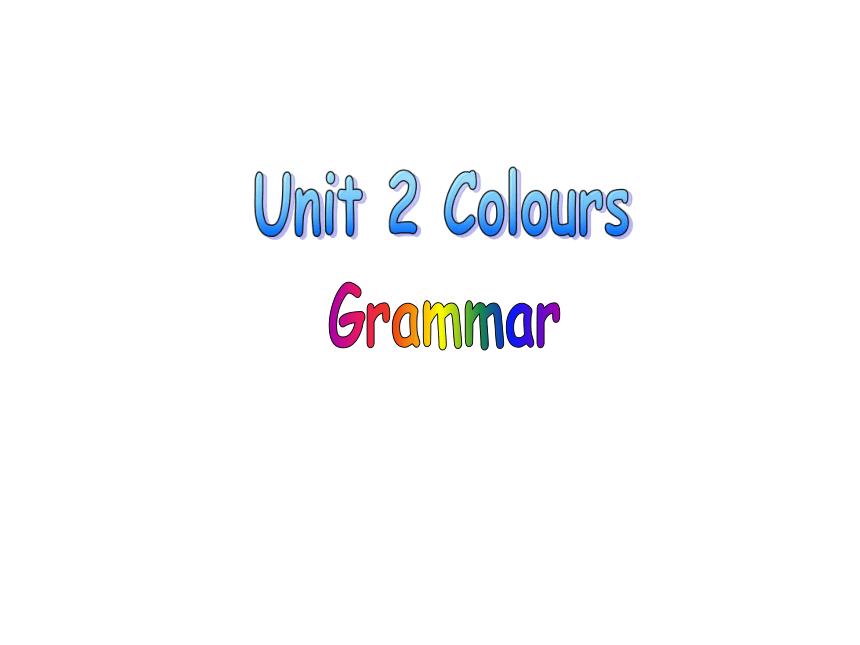
|
|
| 格式 | zip | ||
| 文件大小 | 185.1KB | ||
| 资源类型 | 教案 | ||
| 版本资源 | 牛津译林版 | ||
| 科目 | 英语 | ||
| 更新时间 | 2016-10-14 00:00:00 | ||
图片预览

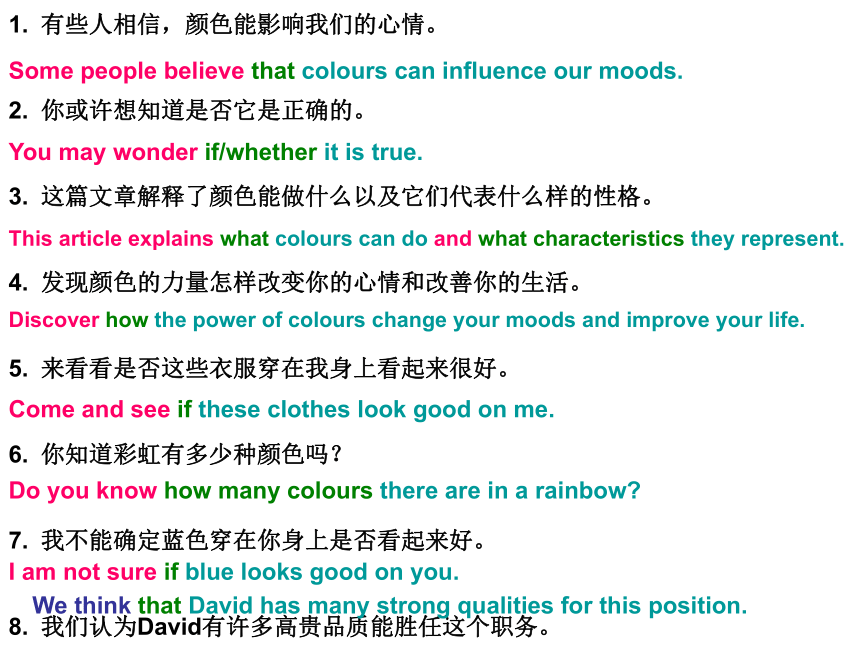
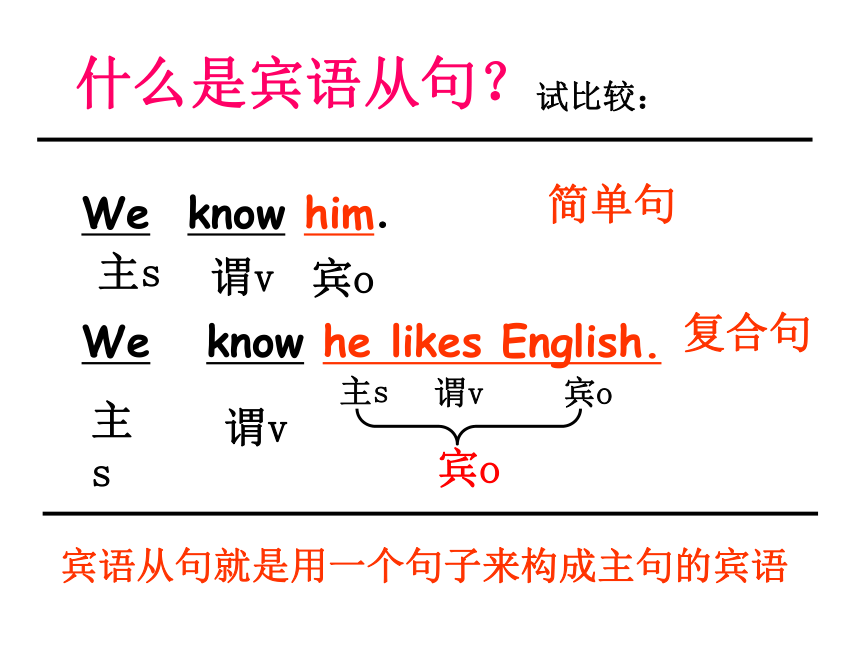
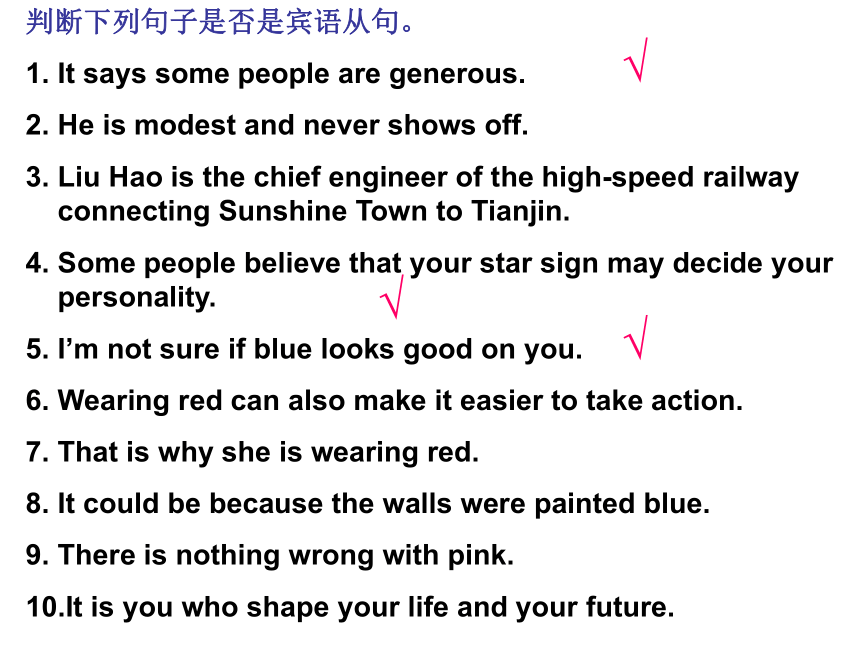
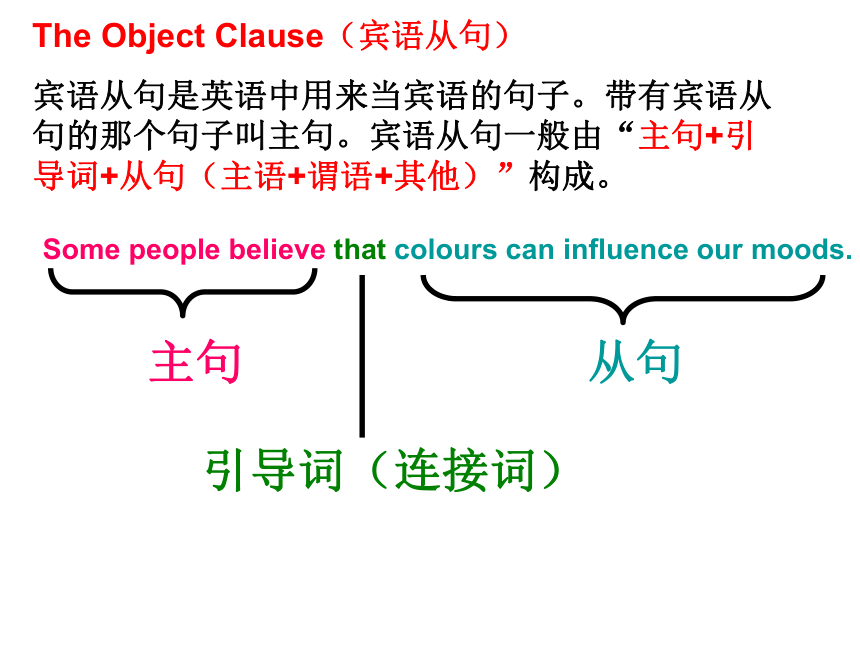

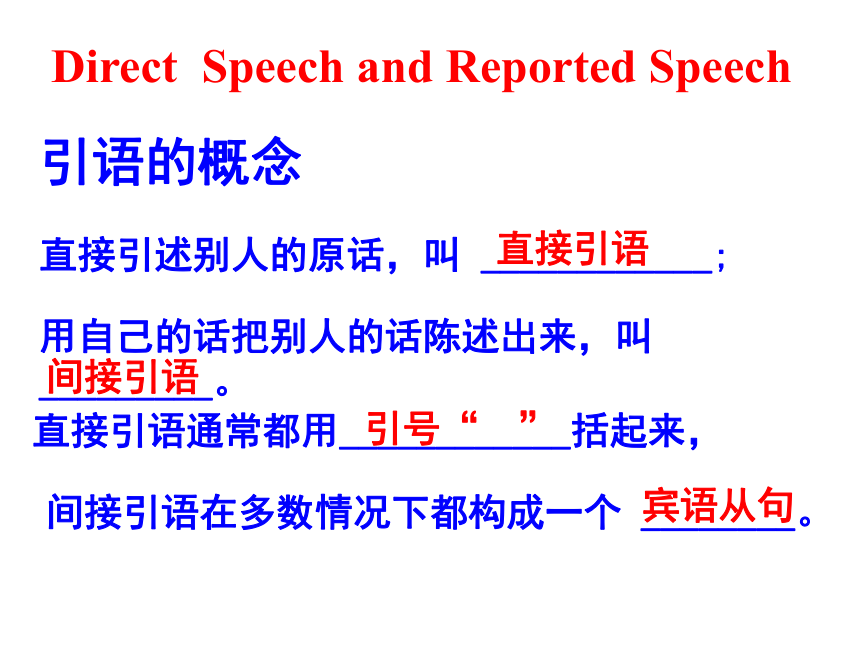
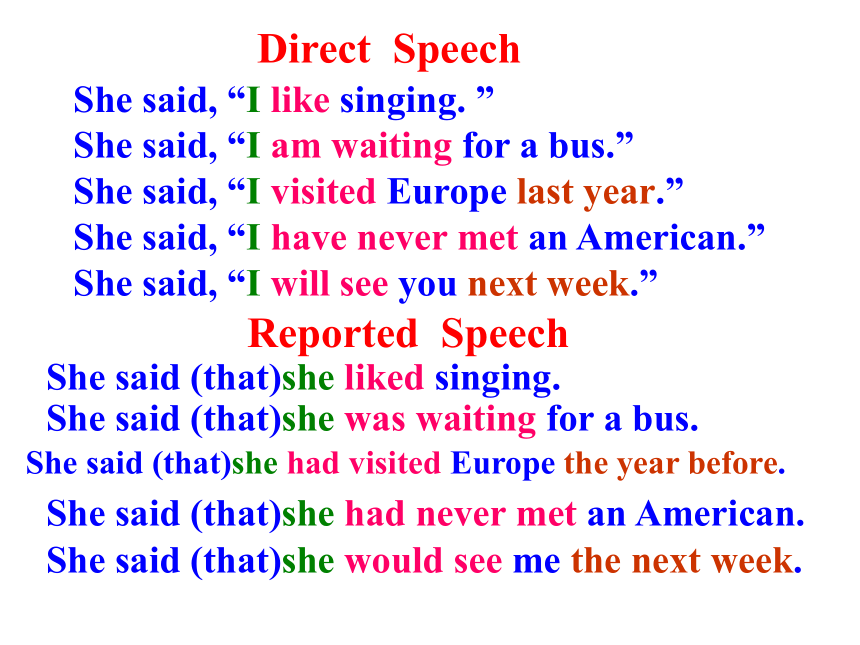
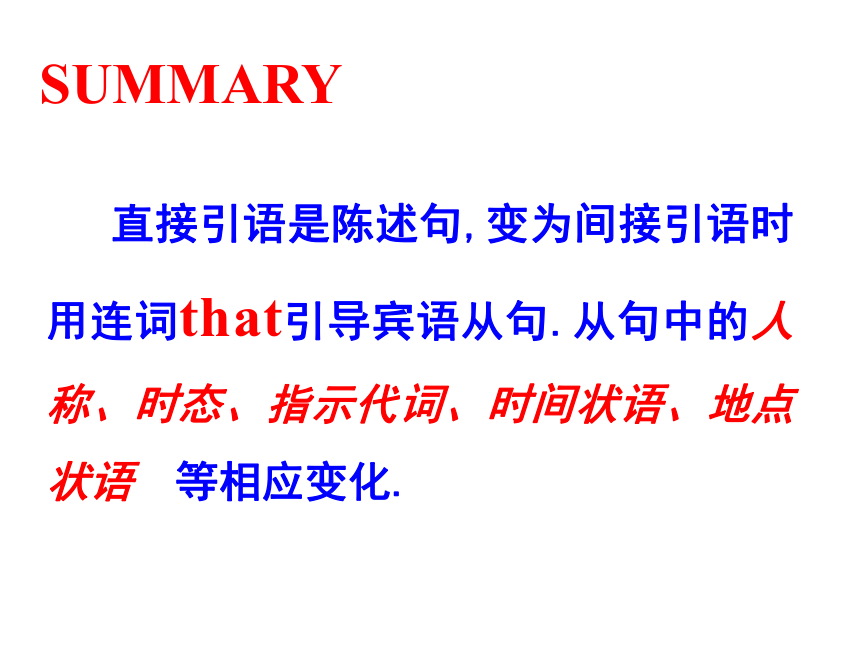

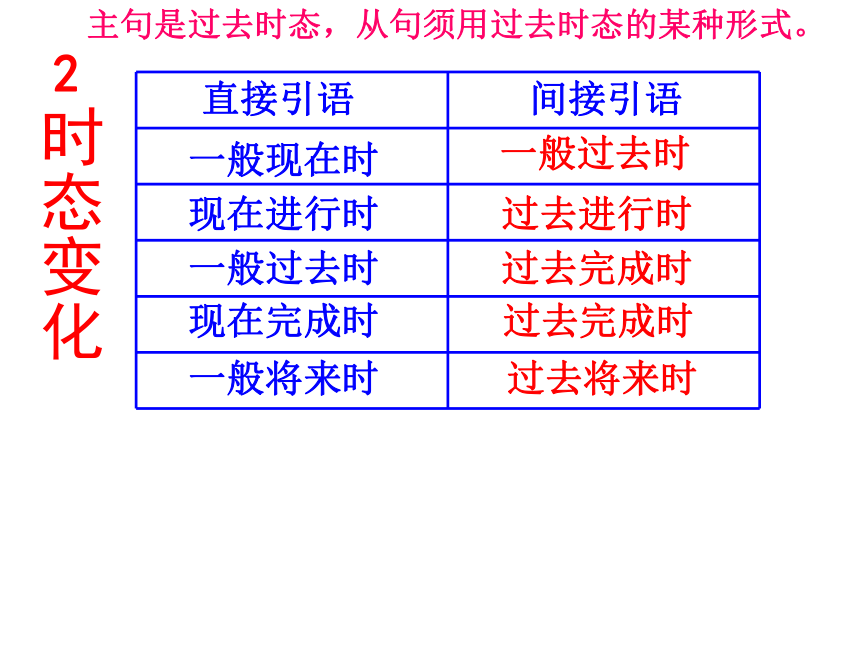
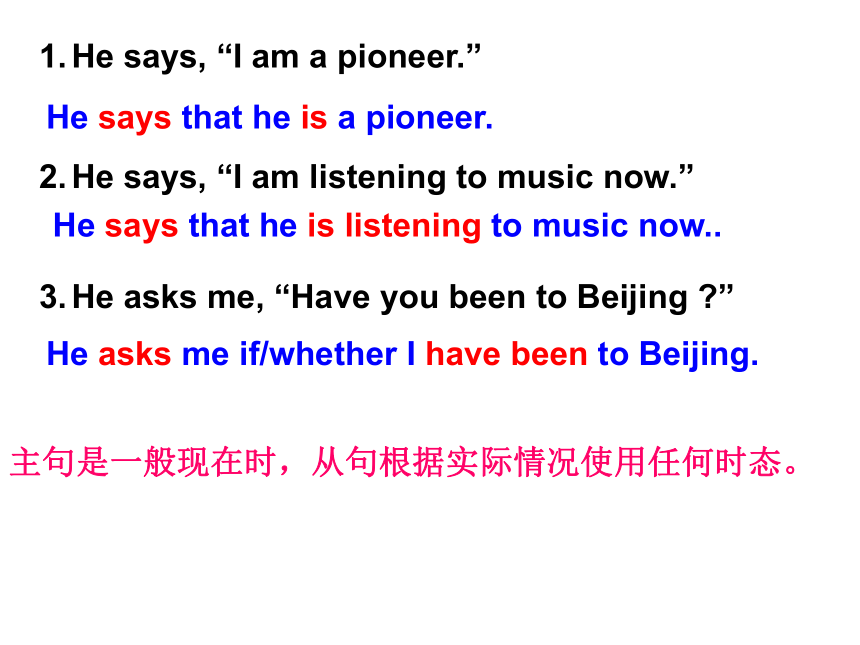
文档简介
课件38张PPT。GrammarUnit 2 Colours有些人相信,颜色能影响我们的心情。
你或许想知道是否它是正确的。
这篇文章解释了颜色能做什么以及它们代表什么样的性格。
发现颜色的力量怎样改变你的心情和改善你的生活。
来看看是否这些衣服穿在我身上看起来很好。
你知道彩虹有多少种颜色吗?
我不能确定蓝色穿在你身上是否看起来好。
我们认为David有许多高贵品质能胜任这个职务。Some people believe that colours can influence our moods.You may wonder if/whether it is true.This article explains what colours can do and what characteristics they represent.Discover how the power of colours change your moods and improve your life.Come and see if these clothes look good on me.Do you know how many colours there are in a rainbow?I am not sure if blue looks good on you.We think that David has many strong qualities for this position.什么是宾语从句?试比较:We know him. We know he likes English.主s主s谓v谓v宾o宾o宾语从句就是用一个句子来构成主句的宾语 简单句复合句判断下列句子是否是宾语从句。
It says some people are generous.
He is modest and never shows off.
Liu Hao is the chief engineer of the high-speed railway connecting Sunshine Town to Tianjin.
Some people believe that your star sign may decide your personality.
I’m not sure if blue looks good on you.
Wearing red can also make it easier to take action.
That is why she is wearing red.
It could be because the walls were painted blue.
There is nothing wrong with pink.
It is you who shape your life and your future.
√√√The Object Clause(宾语从句)
宾语从句是英语中用来当宾语的句子。带有宾语从句的那个句子叫主句。宾语从句一般由“主句+引导词+从句(主语+谓语+其他)”构成。Some people believe that colours can influence our moods.主句从句引导词(连接词)Direct speech & Reported speech 直接引语与间接引语 Direct Speech and Reported Speech引语的概念直接引述别人的原话,叫 ____________;直接引语 用自己的话把别人的话陈述出来,叫 _________。间接引语直接引语通常都用____________括起来, 引号“ ” 间接引语在多数情况下都构成一个 ________。宾语从句Direct Speech Reported SpeechShe said, “I like singing. ”
She said, “I am waiting for a bus.”
She said, “I visited Europe last year.”
She said, “I have never met an American.”
She said, “I will see you next week.” She said (that)she liked singing.She said (that)she was waiting for a bus. She said (that)she had visited Europe the year before.She said (that)she had never met an American. She said (that)she would see me the next week. SUMMARY 直接引语是陈述句,变为间接引语时用连词that引导宾语从句.从句中的人称、时态、指示代词、时间状语、地点状语 等相应变化.1、人称的变化一
随
主二随宾第三
人称
不变
引号内的第一人
称变间引后与主
句主语的人称保
持一致引号内的第二人
称变间引后与主
句宾语的人称保
持一致引号内的第三人
称在变间引后人
称不变She said,“ I like
Tennis.”She said that she
liked tennis.He said to Lily,
“ you must get
up early.”He told Lily that
she must get up
early.She said to me ,
“ They want to
help him.”She told me that
they wanted to
help him.一随主,二随宾,第三人称不更新直接引语 间接引语一般现在时 一般过去时 现在进行时 过去进行时一般过去时 过去完成时现在完成时 过去完成时一般将来时 过去将来时时态变化2主句是过去时态,从句须用过去时态的某种形式。He says, “I am a pioneer.”
He says, “I am listening to music now.”
He asks me, “Have you been to Beijing ?”He says that he is a pioneer.He says that he is listening to music now..He asks me if/whether I have been to Beijing.主句是一般现在时,从句根据实际情况使用任何时态。The teacher said,“The sun is bigger than the earth.”The teacher said that the sun is bigger than the earth.Liu Hao says,“A miss is as good as a mile.”Liu Hao says that a miss is as good as a mile.当宾语从句表示的是一个客观真理或者事实、谚语、
格言时,即使主句是过去时,从句也用一般现在时态。 1. 主句是一般现在时,从句根据实际情况使用任何时态。
例句:The headmaster hopes everything goes well.
2. 主句是过去时态,从句须用过去时态的某种形式。
例句:She was sorry that she hadn’t finished her work on time.
3. 当宾语从句表示的是一个客观真理或者事实时,即使主句是过去时,从句也用一般现在时态。
例句:The teacher told his class that light travels faster than sound.
直接引语 间接引语指示代词 时 间 状 语 地点状语 方向性动词 this, that, these those now, then, today that day this week that week yesterday the day before last week the week before four days ago four days before the day before yesterday two days before tomorrow the next/following daynext month the next/following month here there come, go,bring take 情态动词 can, may, must could,might,had to Direct SpeechReported SpeechShe asked, “Have you seen the film?”She asked me whetherif I had seen the film.He asked, “Are you a doctor, John?”He asked John ifwhether he was a doctor. She asked us, “Where are you going to get off?”She asked us where we were going to get off.He asked them, “Who gave you a talk yesterday?”He asked them who had given them a talk the day before.SUMMARY 直接引语是疑问句,变间接引语时,要从疑问语序变为陈述语序。
直接引语是一般疑问句,变为间接引语时,用连词 if 或 whether 连接。
直接引语是特殊疑问句,变为间接引语时,仍用原来的疑问词作连词来引导。Direct SpeechReported Speech“Never do that again,” the teacher said.The policeman ordered us to be quiet.The policeman ordered:“Be quiet.”The teacher told the boy to open the window The teacher said to the boy ,”Open the window .”The teacher told me not /never to do that again.“Wait a moment.” she said to them.She asked them to wait a moment . 直接引语是祈使句,变成间接引语,把动词原形变成动词不定式,并在动词不定前加tell, ask, order , advise等动词的宾语。
注意:否定句,在动词不定式前加not或never.SUMMARY解题步骤:1.陈述句“I don’t like computers,” Sandy said to her friends.Sandy said to her friendsthat saiddidn’tsheSandy said to her friends that she didn’t like computers.2.一般疑问句:
Is it easy to work out the problem?
( They asked him )They asked himifIt is easy to work out the problem.it is easy to work out the problem.askediswasThey asked him if it was easy to work out the problem.3.特殊疑问句:
When do you harvest the wheat ?
( They asked him )They asked himwhenyou harvest the wheatyou harvest the wheat.heharvestedThey asked him when he harvested the wheat.4.祈使句
Little boy, put on your coat.
(They ordered )They ordered Little boy Little boy, put on your coat. put on your coat.to put They ordered the little boy to put on his coat.his 注意事项1) 人称
2) 时态
3) 相应的时间地点状语
4) 标点符号
5) 大小写
6) 问号改为句号
7) 语序---疑问改陈述
8) 宾语从句由什么引出
9) 祈使句要使用动词不定式来引述Exercises :
1). Betty says to Harry," I want to borrow your book.” 2).My teacher said , “she is a good student.”Betty says to Harry (that) she wants to
borrow his Book. My teacher said that she was a good student.
3) She asked me,” Do you agree with me?”4) Anne asked her mother, “Is there any
delicious food to eat?”She asked me if I agreed with her.Anne asked her mother if there was any
delicious food to eat.5) “ What are you going to do?” he asked. 6)“How do you go to school every day?” asked Mr. Zhang.He asked me what I was going to do.Mr. Zhang asked how I went to school
everyday.7). Mom said,“ Don‘t chat with strangers.”8). “ Go shopping with me, please?” said Mr. Wang .Mom told me not to chat with strangers.Mr. Wang asked me to go shopping with
him.Thank you!1. Some people believe that colours can influence our moods.
2. She hopes that yellow can bring her success.3. He is glad that the walls in his room are blue.
4. She is sure that yellow can bring her good luck.Object clauses introduced by that宾语从句放在及物动词后做宾语,如say, find, know, think, believe, hope, notice, mean.宾语从句也可以放在这些形容词后:如certain, sure, sad, satisfied, glad.work out
the rule Object clauses introduced by “that”.1.An object clause can be put after some verbs, such as_______________ ________________; it can also follow some adjectives such as ____________.
2. “That” can be ommited(省略).
think, believe,
know,hope,mean sure, certain
and glad.work out
the ruleObject clauses introduced
by “if” or “whether”.1.We can use “if ” or “whether ” to
introduce an object clause when it
expresses a ___________________.
2.We often use the same word order
as in a ___________. “Yes/No” question statement(陈述语序)1.在介词后面:
We are worried about whether it will rain tomorrow.
2.在动词不定式前:
He can’t decide whether to go to Canada.Extension1.In these cases, we can only use whether instead of if.3.当与or或or not连用时:
I don’t know whether he’s free or not.
She asks me whether I am from Yancheng or Nanjing.
4.宾语从句提前时:
Whether this is true or not, I can’t say.
5. 在动词discuss后面的宾语从句中
We discussed whether we would have a sports meeting the next week.Fill in the blanks with if or whether.
1. Uncle John came up to see _________ there was anything wrong with the computer.
2. The shopkeeper asked my father ________ or not he wanted to choose a big Christmas tree.
3. I don’t know __________ to go or stay?
4. _______ time runs out, what should we do?
5. ________ they will ever become future Olympic champions, only time will tell.if/whetherwhetherwhetherWhetherIf宾语从句可用于动词之后,常见动词有:
know, think, believe, hope, mean…
还可用于从句形容词之后, 常见形容词有:
certain, sure, glad…
*在非正式文体中,that可以省略
eg: I am glad (that)_________________
( 你赢了这比赛).
He is sure(that)_________________ ( 他能通过考试)连词that引导_____的宾语从句you won the game he can pass the examConclusion(1): 陈述句2. 宾语从句中要用________ 语序.Conclusion(2):注意:1. whether和if意思为“是否” ,一般情况下两者可以换用,但与____________ 连用,只能用 whether。
2.if是“如果”的意思时,主句(_________) +if+从句(________).1. 一般疑问句我们要用____或 _______ 来引导if陈述句whetheror或or not一般将来时一般现在时3. 宾语从句中要注意人称的变化.if 与whether 的区别I don’t know ______ he will come or not.
I am not sure ______ he is handsome.
He will go climbing ______ it doesn’t rain tomorrow.
I don’t know if ZhangJie____________( come) to our school next week.
I________ (show) him around our school if ZhangJie______(come) to our school next week.
与or not 连用只能用whetherif意思为“如果”whetherif/whetherifwill comewill showcomesif意思为“是否”if意思为“如果”
你或许想知道是否它是正确的。
这篇文章解释了颜色能做什么以及它们代表什么样的性格。
发现颜色的力量怎样改变你的心情和改善你的生活。
来看看是否这些衣服穿在我身上看起来很好。
你知道彩虹有多少种颜色吗?
我不能确定蓝色穿在你身上是否看起来好。
我们认为David有许多高贵品质能胜任这个职务。Some people believe that colours can influence our moods.You may wonder if/whether it is true.This article explains what colours can do and what characteristics they represent.Discover how the power of colours change your moods and improve your life.Come and see if these clothes look good on me.Do you know how many colours there are in a rainbow?I am not sure if blue looks good on you.We think that David has many strong qualities for this position.什么是宾语从句?试比较:We know him. We know he likes English.主s主s谓v谓v宾o宾o宾语从句就是用一个句子来构成主句的宾语 简单句复合句判断下列句子是否是宾语从句。
It says some people are generous.
He is modest and never shows off.
Liu Hao is the chief engineer of the high-speed railway connecting Sunshine Town to Tianjin.
Some people believe that your star sign may decide your personality.
I’m not sure if blue looks good on you.
Wearing red can also make it easier to take action.
That is why she is wearing red.
It could be because the walls were painted blue.
There is nothing wrong with pink.
It is you who shape your life and your future.
√√√The Object Clause(宾语从句)
宾语从句是英语中用来当宾语的句子。带有宾语从句的那个句子叫主句。宾语从句一般由“主句+引导词+从句(主语+谓语+其他)”构成。Some people believe that colours can influence our moods.主句从句引导词(连接词)Direct speech & Reported speech 直接引语与间接引语 Direct Speech and Reported Speech引语的概念直接引述别人的原话,叫 ____________;直接引语 用自己的话把别人的话陈述出来,叫 _________。间接引语直接引语通常都用____________括起来, 引号“ ” 间接引语在多数情况下都构成一个 ________。宾语从句Direct Speech Reported SpeechShe said, “I like singing. ”
She said, “I am waiting for a bus.”
She said, “I visited Europe last year.”
She said, “I have never met an American.”
She said, “I will see you next week.” She said (that)she liked singing.She said (that)she was waiting for a bus. She said (that)she had visited Europe the year before.She said (that)she had never met an American. She said (that)she would see me the next week. SUMMARY 直接引语是陈述句,变为间接引语时用连词that引导宾语从句.从句中的人称、时态、指示代词、时间状语、地点状语 等相应变化.1、人称的变化一
随
主二随宾第三
人称
不变
引号内的第一人
称变间引后与主
句主语的人称保
持一致引号内的第二人
称变间引后与主
句宾语的人称保
持一致引号内的第三人
称在变间引后人
称不变She said,“ I like
Tennis.”She said that she
liked tennis.He said to Lily,
“ you must get
up early.”He told Lily that
she must get up
early.She said to me ,
“ They want to
help him.”She told me that
they wanted to
help him.一随主,二随宾,第三人称不更新直接引语 间接引语一般现在时 一般过去时 现在进行时 过去进行时一般过去时 过去完成时现在完成时 过去完成时一般将来时 过去将来时时态变化2主句是过去时态,从句须用过去时态的某种形式。He says, “I am a pioneer.”
He says, “I am listening to music now.”
He asks me, “Have you been to Beijing ?”He says that he is a pioneer.He says that he is listening to music now..He asks me if/whether I have been to Beijing.主句是一般现在时,从句根据实际情况使用任何时态。The teacher said,“The sun is bigger than the earth.”The teacher said that the sun is bigger than the earth.Liu Hao says,“A miss is as good as a mile.”Liu Hao says that a miss is as good as a mile.当宾语从句表示的是一个客观真理或者事实、谚语、
格言时,即使主句是过去时,从句也用一般现在时态。 1. 主句是一般现在时,从句根据实际情况使用任何时态。
例句:The headmaster hopes everything goes well.
2. 主句是过去时态,从句须用过去时态的某种形式。
例句:She was sorry that she hadn’t finished her work on time.
3. 当宾语从句表示的是一个客观真理或者事实时,即使主句是过去时,从句也用一般现在时态。
例句:The teacher told his class that light travels faster than sound.
直接引语 间接引语指示代词 时 间 状 语 地点状语 方向性动词 this, that, these those now, then, today that day this week that week yesterday the day before last week the week before four days ago four days before the day before yesterday two days before tomorrow the next/following daynext month the next/following month here there come, go,bring take 情态动词 can, may, must could,might,had to Direct SpeechReported SpeechShe asked, “Have you seen the film?”She asked me whetherif I had seen the film.He asked, “Are you a doctor, John?”He asked John ifwhether he was a doctor. She asked us, “Where are you going to get off?”She asked us where we were going to get off.He asked them, “Who gave you a talk yesterday?”He asked them who had given them a talk the day before.SUMMARY 直接引语是疑问句,变间接引语时,要从疑问语序变为陈述语序。
直接引语是一般疑问句,变为间接引语时,用连词 if 或 whether 连接。
直接引语是特殊疑问句,变为间接引语时,仍用原来的疑问词作连词来引导。Direct SpeechReported Speech“Never do that again,” the teacher said.The policeman ordered us to be quiet.The policeman ordered:“Be quiet.”The teacher told the boy to open the window The teacher said to the boy ,”Open the window .”The teacher told me not /never to do that again.“Wait a moment.” she said to them.She asked them to wait a moment . 直接引语是祈使句,变成间接引语,把动词原形变成动词不定式,并在动词不定前加tell, ask, order , advise等动词的宾语。
注意:否定句,在动词不定式前加not或never.SUMMARY解题步骤:1.陈述句“I don’t like computers,” Sandy said to her friends.Sandy said to her friendsthat saiddidn’tsheSandy said to her friends that she didn’t like computers.2.一般疑问句:
Is it easy to work out the problem?
( They asked him )They asked himifIt is easy to work out the problem.it is easy to work out the problem.askediswasThey asked him if it was easy to work out the problem.3.特殊疑问句:
When do you harvest the wheat ?
( They asked him )They asked himwhenyou harvest the wheatyou harvest the wheat.heharvestedThey asked him when he harvested the wheat.4.祈使句
Little boy, put on your coat.
(They ordered )They ordered Little boy Little boy, put on your coat. put on your coat.to put They ordered the little boy to put on his coat.his 注意事项1) 人称
2) 时态
3) 相应的时间地点状语
4) 标点符号
5) 大小写
6) 问号改为句号
7) 语序---疑问改陈述
8) 宾语从句由什么引出
9) 祈使句要使用动词不定式来引述Exercises :
1). Betty says to Harry," I want to borrow your book.” 2).My teacher said , “she is a good student.”Betty says to Harry (that) she wants to
borrow his Book. My teacher said that she was a good student.
3) She asked me,” Do you agree with me?”4) Anne asked her mother, “Is there any
delicious food to eat?”She asked me if I agreed with her.Anne asked her mother if there was any
delicious food to eat.5) “ What are you going to do?” he asked. 6)“How do you go to school every day?” asked Mr. Zhang.He asked me what I was going to do.Mr. Zhang asked how I went to school
everyday.7). Mom said,“ Don‘t chat with strangers.”8). “ Go shopping with me, please?” said Mr. Wang .Mom told me not to chat with strangers.Mr. Wang asked me to go shopping with
him.Thank you!1. Some people believe that colours can influence our moods.
2. She hopes that yellow can bring her success.3. He is glad that the walls in his room are blue.
4. She is sure that yellow can bring her good luck.Object clauses introduced by that宾语从句放在及物动词后做宾语,如say, find, know, think, believe, hope, notice, mean.宾语从句也可以放在这些形容词后:如certain, sure, sad, satisfied, glad.work out
the rule Object clauses introduced by “that”.1.An object clause can be put after some verbs, such as_______________ ________________; it can also follow some adjectives such as ____________.
2. “That” can be ommited(省略).
think, believe,
know,hope,mean sure, certain
and glad.work out
the ruleObject clauses introduced
by “if” or “whether”.1.We can use “if ” or “whether ” to
introduce an object clause when it
expresses a ___________________.
2.We often use the same word order
as in a ___________. “Yes/No” question statement(陈述语序)1.在介词后面:
We are worried about whether it will rain tomorrow.
2.在动词不定式前:
He can’t decide whether to go to Canada.Extension1.In these cases, we can only use whether instead of if.3.当与or或or not连用时:
I don’t know whether he’s free or not.
She asks me whether I am from Yancheng or Nanjing.
4.宾语从句提前时:
Whether this is true or not, I can’t say.
5. 在动词discuss后面的宾语从句中
We discussed whether we would have a sports meeting the next week.Fill in the blanks with if or whether.
1. Uncle John came up to see _________ there was anything wrong with the computer.
2. The shopkeeper asked my father ________ or not he wanted to choose a big Christmas tree.
3. I don’t know __________ to go or stay?
4. _______ time runs out, what should we do?
5. ________ they will ever become future Olympic champions, only time will tell.if/whetherwhetherwhetherWhetherIf宾语从句可用于动词之后,常见动词有:
know, think, believe, hope, mean…
还可用于从句形容词之后, 常见形容词有:
certain, sure, glad…
*在非正式文体中,that可以省略
eg: I am glad (that)_________________
( 你赢了这比赛).
He is sure(that)_________________ ( 他能通过考试)连词that引导_____的宾语从句you won the game he can pass the examConclusion(1): 陈述句2. 宾语从句中要用________ 语序.Conclusion(2):注意:1. whether和if意思为“是否” ,一般情况下两者可以换用,但与____________ 连用,只能用 whether。
2.if是“如果”的意思时,主句(_________) +if+从句(________).1. 一般疑问句我们要用____或 _______ 来引导if陈述句whetheror或or not一般将来时一般现在时3. 宾语从句中要注意人称的变化.if 与whether 的区别I don’t know ______ he will come or not.
I am not sure ______ he is handsome.
He will go climbing ______ it doesn’t rain tomorrow.
I don’t know if ZhangJie____________( come) to our school next week.
I________ (show) him around our school if ZhangJie______(come) to our school next week.
与or not 连用只能用whetherif意思为“如果”whetherif/whetherifwill comewill showcomesif意思为“是否”if意思为“如果”
